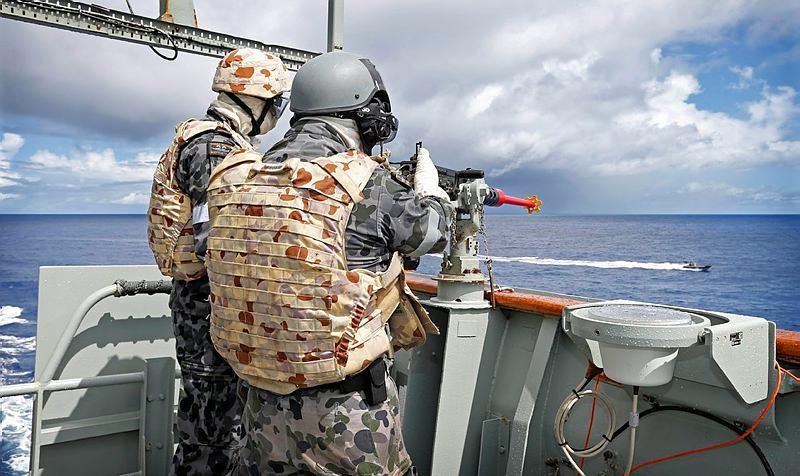Surface warships and the quest for sea control
Posted By Hugh White on September 4, 2015 @ 06:00
As always, one admires James Goldrick’s spirited defence [2] of the importance of sea control to Australia’s defence strategy, and of the priority for major warships in our force structure. He suspects sceptics like me of waging a campaign against a national shipbuilding effort, but he might accept instead that we are simply arguing for major capability decisions to be based on a clear understating of our strategic objectives and the most cost-effective ways to achieve them. And I’m sure he’s all in favour of that.
Another thing James and I agree on is the nature of sea control as a maritime operational objective. As he says, the aim of sea control is to put ourselves in a position to transit the sea by reducing the chance that an adversary will be able to stop us. Sea control against a capable adversary is seldom if ever absolute: at most it can be achieved in a particular body of water for a particular period of time and to a degree that reduces rather than eliminates the risk of interdiction.
But that remains a formidable task. Sea control is essentially defensive, and so it suffers from the inherent disadvantage that defence must succeed all the time, while attack need only succeed once.
It’s this need for continuous defence that makes warships so central to sea control, because only they have the endurance and persistence to provide it. But those ships themselves then need to be protected, and as ships become easier to find and easier to hit, which they have been doing for well over a century now, that task alone absorbs more and more effort and cost, and offers less and less chance of success.
James is sure that warships can be defended because modern maritime warfare employs complex systems linking dispersed sensors and weapons in a network which is more potent than any single platform. That’s all true, but we and our friends don’t have a monopoly on this. The adversary has networks too, so we need to ask whether networking helps a defender more than an attacker. I see no reason to assume, as James does, that it’s the former. Much more likely that networked combat swings the advantage even further to the attacker.
Second, James himself argues that networks will be extremely vulnerable to cyber attacks in future conflicts, so our ships may well find themselves fighting alone again anyway.
More importantly, however, keeping the warship itself afloat doesn’t achieve any broader strategic objectives. The next question therefore is how sure we can be that, even if they can defend themselves, our warships could effectively defend other ships as well. The answer is discouraging.
Even with a massive investment, there remains only a slender chance that sea control could be established and sustained against a capable adversary to the degree required to achieve our strategic objectives. So this investment is therefore most likely wasted, at massive opportunity cost.
James resists this argument. He seems convinced that if sea control is necessary, or even desirable, then it must be possible. Alas the world is not that kindly. And so we need to explore more carefully how necessary sea control really is, and what the alternatives are. James suggests that the most important requirement is to sustain fuel supplies.
The problem is real enough, but we shouldn’t assume that a hugely expensive and probably futile effort to sustain sea control is a credible, let alone cost-effective, way to deal with it. Perhaps we need to look more carefully stockpiling and at restoring indigenous production and refining capacity. That might be expensive, but it could still be a much cheaper, more effective solution to the problem than a fleet of Future Frigates with a life-time cost of well over $50 billion.
James worries about the quality of public debate about these issues, and he’s right to do so. But the bigger concern is the quality of government decision-making about major capability choices which will shape Australia’s military options for decades to come. There’s no evidence that ministers or their senior advisers have considered the basic questions about maritime strategy and operations we have been debating here before committing themselves to SEA 5000. That seems to me a very serious failure.
Article printed from The Strategist: https://aspistrategist.ru
URL to article: /surface-warships-and-the-quest-for-sea-control/
URLs in this post:
[1] Image: https://aspistrategist.ru/wp-content/uploads/2015/09/20141210ran8581277_003.jpg
[2] spirited defence: https://aspistrategist.ru/defending-the-surface-combatant/
Click here to print.
